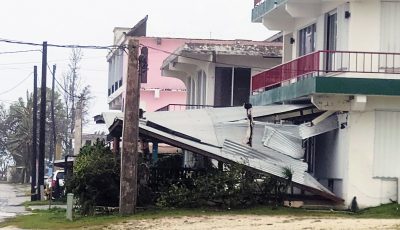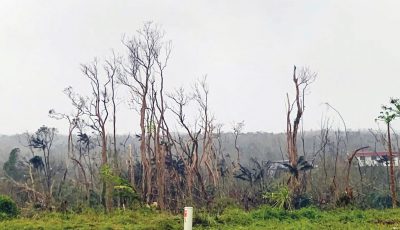Demystification of power politics is a long-term process. Let’s continue…
Influence and power
The Marianas Islands, the Western Pacific, and the East Asia regions have been influenced by European expansionism for centuries. America has followed this Western-style approach to conquest since its inception. The outcome of World War II presented the U.S. with the opportunity to write the international rules in its favor, which included the complete colonization, altering and shaping of Guam, the CNMI and her ancient Chamorro Pacific Islander civilization.
Postwar Japan was reconstructed with deep American military and intelligence involvement. The U.S. succeeded in strategically shaping how Japan and its national government would go about doing America’s bidding throughout the region. The U.S. saw initial limited success at containing Russia in a war of agency fought on the Korean Peninsula, followed by an extended Cold War and America’s defeat in Vietnam.
Today, America continues to underwrite a post-Cold War security umbrella throughout the Pacific Basin and East Asia, working closely with a medium length list of partners while doing little to nothing to support the reversal of congressional and Pentagon sponsored human rights violations—environmental, political, linguistic, social, and cultural—made against the Chamorro people of Guam.
Stabilizing? Destabilizing?
America, however, has also been an overall stabilizing factor in the broader region for decades. Now America’s security framework is experiencing its greatest challenge since its postwar laydown over seven decades ago. The ability of the United States to exert uncontested influence and power has waned, in part because of China’s rise and willingness to take on American economic and military primacy.
This great power rivalry can be measured and observed through a variety of units and goalposts. One unit in which Sino-American relations are viewed is through the lens of developments taking place in the South China Sea. The South China Sea represents a key unit of measure because it is one of the planet’s most important waterways, where 30% of the world’s trade passes through—to include massive amounts of Middle Eastern oil—and where over 50% of the world’s fishing vessels troll. All this is taking place above substantial proven and unproven oil and natural gas reserves. So far, China appears to be ahead using this unit of measure because it has succeeded at taking and building up two island chains within the South China Sea that remain historically disputed areas.
Xi Jinping and the Chinese Communist Party
China is a regional East Asian military power and a world leader in technology, green technology and digital communications. General Secretary Xi Jinping continues to amass power as he builds out China’s economic base and undertakes expansionist foreign policy measures intended to grow overall material prosperity and Chinese influence throughout Oceania, Southeast Asia, Australia and Europe. Xi Jinping is attempting to rewrite American-led post-World War II international norms using the Belt and Road Initiative as the centerpiece to create a Chinese-led geopolitical order, outside and inelastic to American influence.
China will continue to grow its power as it jumpstarts new ways to drive additional developments in artificial intelligence, communications, electric vehicle and bus use, financial technology, and health care technology with the full support of the CCP.
America in relative decline
America has taken huge losses from the massive intellectual property and technology theft spree sponsored by China. The United States’ position of power has been damaged. America is also grappling with historically high levels of national debt, spending huge amounts on military considerations, struggling with high unemployment rates, and a toxic political landscape. The United States has fallen behind in keeping up with the CCP’s efforts to digitize its currency, which has additional implications for America’s standing in the world. Trillions of dollar-denominated transactions take place every day worldwide and total nation state holdings of the U.S. dollar as the prime currency reserve is increasingly being threatened.
America’s strategic mistake was going to war in Iraq and Afghanistan, and we lost. The outcome of these wars is that trillions of dollars have been spent, hundreds of thousands of people have perished, and China has become much stronger.
More clarity and understanding is required
A clearer articulation of what constitutes America’s overall long-term strategy toward China is sorely needed because much is at risk and unanswered questions persist.
How long will America continue to underwrite huge national security bills in the Western Pacific and East Asia regions that are inviting massive environmental and cultural damage to the islands of our ancient Chamorro Pacific Islander civilization? What is the long-term strategy to combat climate change with China as a partner? What role will American diplomacy have in the region as a tool of imperial power and statecraft? Can America really contain or control the Chinese and vice versa? Or are we still holding on to a Cold War mindset that no longer applies?
What is clear is that historic levels of hyper-militarization and destructive military activity taking place throughout the Marianas Islands continue to be performed in part to deter China from starting a war with the U.S. or its allies. The United States has calculated that it cannot further diminish its perceived standing, and ability to project lethal military power, and thus influence, in the region.
The problem with this view is that as America seeks to deter war with China and support and protect its economic and political interests and commitments, it has also produced permanent damage to the Marianas Islands and plans to further destroy or control already rare and pristine human, cultural and environmental resources contained throughout our ancient island chain without fully seeking the prior, unentangled, or written consent of our Chamorro Pacific Islander civilization. This is fascist. America can do better, much better.



























